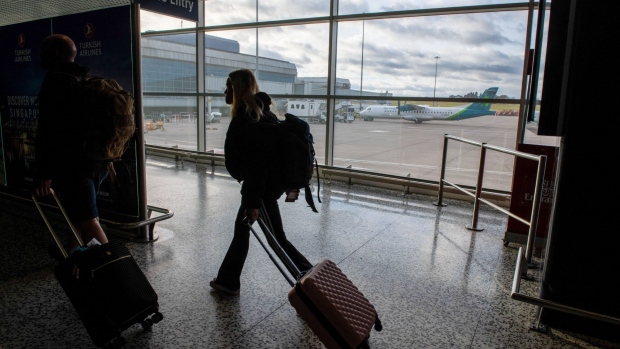Jun 26, 2024
UK Airport Endures Chaos and Extra Cost After Liquid Rule Change
, Bloomberg News

(Bloomberg) -- Birmingham Airport spent £60 million ($76.1 million) to accommodate state-of-the-art baggage scanners meant to speed security screening by doing away with strict liquid rules. Now unforeseen government restrictions, alongside yet-to-be completed construction work, are creating the kind of bottlenecks that the new equipment was supposed to overcome.
The UK Department for Transport said earlier this month that it would temporarily reinforce the 100-milliliter carry-on rule nationwide to “enable further improvements” to the next-generation systems. The about-face, on top of ongoing construction work in the terminal, has resulted in passengers suffering through long waiting times during peak hours to get through security. The airport estimates it removes 1.5 tons of liquids every day from hand luggage to ensure passengers comply with the rules.
“In the long run, that investment of £60 million will be money well-spent,” Birmingham Airport Chief Executive Officer Nick Barton said in an interview. “The frustration is we can’t use it as intended and the real frustration is the impact it’s had on our passengers.”
Birmingham, which served almost 11.5 million passengers last year and ranks 7th in the UK, behind hubs such as Heathrow, Gatwick or Manchester, has been forced to spend more on staffing and facilities such as a temporary marquee to check passenger’s hand-held bags before they reach the scanners, Barton said. The investments are crucial to minimize disruption at peak times.
The airport became the focus of public attention in recent weeks after the scanner reversal led to chaotic scenes. Passengers said they had to endure waits of several hours to get through security, with lines snaking out of the main building and into makeshift tents assembled to accommodate the masses.
Birmingham was already subject to liquid restrictions that were meant to be eased this summer, before the government unexpectedly introduced temporary measures that effectively reversed course. The airport had expected to be able to let passengers through with 2-liter bottles this month.
The temporary rule change allows time to further improve the security scanner systems, a Department for Transport spokeswoman said in an emailed statement. It only affects passengers traveling from six regional airports with the equipment, she said.
Birmingham was the first major UK airport to meet the government’s June deadline to switch over to the scanners, joining London City and Teesside airports, while larger hubs were granted a one-year extension. Airports are currently in the dark about when the government will lift the temporary liquid rule, meaning passengers will have to stick to the 100-milliliter bottle restriction.
“It’s costing us a fortune,” Barton said. “We’ve just got to spend it to minimize the disruption.”
©2024 Bloomberg L.P.


